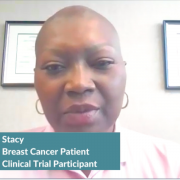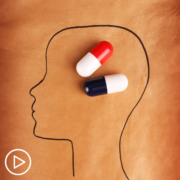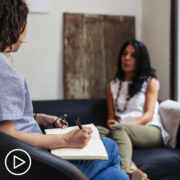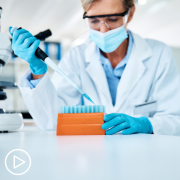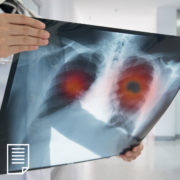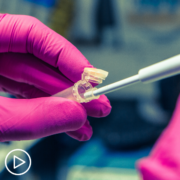Triple-Negative Breast Cancer: Stacy’s Clinical Trial Profile
Triple-Negative Breast Cancer: Stacy’s Clinical Trial Profile from Patient Empowerment Network on Vimeo.
Triple-negative breast cancer patient Stacy was diagnosed by a breast cancer surgeon she works with. Watch as she shares her journey through diagnosis, her decision to join a clinical trial, her experience with treatment, and her current feelings about clinical trials.
See More from Patient-to-Patient Diverse Breast Cancer Clinical Trial Profiles
Transcript:
Stacy:
I was diagnosed by a medical provider that I work for, she’s a breast surgeon, and once I was diagnosed, because I’m in the environment of breast surgeons and breast multi-discipline providers, my care was probably handled a little differently. So, I was referred to an oncologist who then introduced me to the clinical, the breast clinical trial that was available. I actually didn’t have a lot of questions except for will it help others? And he said it would, it’s for triple-negative diagnosed patients. The trial is an additional drug that helps with the triple-negative, and it has been provided by the FDA. So, because of that, I was willing to do it. My only pushback was that the treatment was every week compared to it being every two weeks or three weeks. The first phase…for me was…I had no problems with it. Actually, after treatment, I was up for 48 hours, which allowed me to do a lot of things – house work, part-time job, working remotely, it just afforded me things that I would not be able to do for being tired.
I always have had my screens, and I’ve had diagnostic mammograms and they always came back normal, so negative. And this particular time, I had Dr. Hampton to just look at it, it just felt like a cyst. I wasn’t really concerned with it. So Dr. Hampton did look at it, we thought initially that it was a cyst and not infected, but two weeks later that what felt soft then became very hard and round, oval-shaped. I was just…in two weeks, it was already hard. So I said, okay, so I had her to look at it again, and from there she said, You need to have this worked up.” And then from there, I went and had another diagnostic mammogram, and the next day I was scheduled for a biopsy by the top radiologist. And he said, “Stacy, I think that you need to have an MRI.”
Right, and so I had an MRI, had a CAT scan, all that was done within two weeks, and they tell me that I had cancer. Dr. Hampton…this is kind of funny because the staff scheduled my appointment, as I am the manager of the breast center. They scheduled my appointment. I met with her, and she let me know that I was triple-negative and that it would require chemo as well as radiation and surgery. The following week, I was scheduled for chemo.
Once I spoke with the oncologist, he said he employed me to look up the trial, and it would be beneficial to others. I initially was not that excited about the trial, I reached out to others who were triple-negative here in our office to ask and what they thought about it. One of the patients/friend, she already knew of the trials, she gave me three different trials that were going on right now. And one of them happened to be the one that he suggested that I should participate in, and she just basically said we would be helping…that I will be helping others to participate in it. So I thought about it for about two or three days, and then I decided to participate in it. Now initially, I wasn’t so keen on it, but after hearing about helping others and that it was mostly, I was told that it was almost like a miracle, medicine that helped triple-negative. And I decided to do it.
During my trial, the lump that I felt once I started on a trial treatment in three weeks, the lump was gone. And each week it wasn’t completely, but it reduced itself in three weeks. And as I continue with the treatment, we couldn’t feel it. I had my provider that I was seeing, the oncologist, and each week it was almost like it was gone, it was totally amazing because prior to that, it probably…it felt like the size of maybe a large, grape, but it just in three weeks, it was totally a big difference. So, I know that the trial is good. It has to be because in three weeks or something that I’m thinking probably grew in six weeks, whereas I was able to feel it, I couldn’t feel it anymore, and that three to four, it was gone.
So prior to being diagnosed, there were a multitude of things that I did not know. Working for a breast surgeon, where we see those patients and then becoming one of those diagnosed patients are totally two different things. What I thought I knew, it became apparent that I didn’t know, and there were things like the metallic taste that you have in your mouth, you can no longer use metals, anything, utensils…you have to use plasticware. The neuropathy that you feel in your hands, it’s hard to pick up anything that’s metal, the feeling just kind of goes through your hand, that means keys, that’s a door knob, you just have to kind of suck it up and do what you have to. The tiredness, but they don’t let you know that you’ll feel exhausted. That’s totally different from tired. So once you’re diagnosed, you have to see a multitude of providers, specialists, you have imaging that’s done, and the team that I have had done most of that for me, so I have a great support team.
Life today is, I have my up and down days, for the most part, my days are good. Once I have my treatment, my first phase went so well, I wasn’t tired. I was still doing things that I normally do with the exception that I had gained a lot of weight. So my second trial started about four weeks ago, and it hit me very hard, I was so exhausted, I have never in my life been that exhausted, that…taking two steps, and I felt like I had ran a marathon. With me being so independent and knowing or wanting to be around my team, I forced myself to come into work, and the second trial also brought on bone pain, muscle pain, headaches, and again, I was just totally exhausted from it.
What you have experienced or endured at the time, during a clinical trial and expressing it, it can only help the next person. But, in essence, I think the clinical trial is not in that only to help someone else, but it’s also to help you…I think the knowledge of just knowing that you’re a part of something that could be enhanced or approved or just help you with your health is a plus. So, working with a breast surgeon and working with multi-discipline providers that’s on the team, oncology radiology, technologist, and seeing the impact that it has on patients, I wanted to participate in the trial because again, I knew that it would help people. So just being a part of that environment definitely impacted my decision in participating in the trial. With the scientific studies that they have out there with the trial, it can only make the research for us better.

